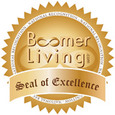A Chinese proverb says that we naturally see the beauty of youth, but must learn to see the beauty of age.
I read an article recently by Susan Jacoby titled The Myth of Aging Gracefully. It is a thought provoking piece about the over exuberance with which our culture (boomers mainly) embraces anti-aging—or the triumph of hope over experience.
Since January 1, 2011, the demographic transition became real for baby boomers…the oldest turned 65. This often stated fact is tired now, but the reality is still settling in (however uneasy it makes us all feel). For the next 19 years 10,000 boomers a day will reach this milestone—a fact not lost on those of us in the field of gerontology.
Happy Gerontology
H. R. Moody, one of the country’s leading gerontologist, once mentioned the term “happy gerontology” —then went on to describe it as an un-realistic view of aging; ageless-aging, if you will. He noted that if we embrace the denial of aging it can be soul eroding, in that you will miss the lessons each period of life has to offer. My experience tells me he’s right.
We all love seeing those who seem to defy aging; a Betty White, or a Warren Buffett—and in my own experience, 90 year old marathoner Mavis Lindgren. I still recall the negative feedback I got when giving a talk about Mrs. Lindgren’s amazing physical abilities to a group of seniors in a care facility…the message wasn’t well received by some who didn’t fair as well in old age as she had.
The fact is, as Jacoby eludes to in her article, that physical and financial hardships mount as people move beyond the relative hardy 60s and 70s (“young-old”) and the territory gets harsher into 80s and 90s (old-old). The incidence of Alzheimer’s disease is 50% for those over the age of 85; and two thirds of Americans older than 85 are women, who usually become poorer with age.
Defying Age Comes at a Cost
Jacoby notes that age-defying hope and hype do nothing to address the over-whelming political issue of how to pay for Medicare and Social Security, or the many personal decisions about aging in place, retirement, or end-of-life issues that are just off shore brewing for many of us.
Jacoby also warns that many of us must prepare for the possibility that not the best, but some of the worst years of our lives may lie ahead if we live to the oldest-old age group.
Geriatrician Muriel R. Gillick, in her book “The Denial of Aging,” emphasizes the social consequences of faith in an ageless old age: “If we assume that Alzheimer’s disease will be cured and disability abolished in the near term,” she writes, “we will have no incentive to develop long-term-care facilities that focus on enabling residents to lead satisfying lives despite their disabilities.” More important, blind faith in medical solutions prevents discussion about the urgent nonmedical needs of the old. Americans need not only better long-term-care facilities for the sickest old but community-based services to foster independence for the healthier old.
The article ends by stating that only when we abandon the fantasy that age can be defied, will we begin a conversation based on reason and not on yearning for a fountain of youth, about how to make 90 a better 90. Best to not view aging solely as the absence of youth, but to instead live fully within each age and make the future a part of your current philosophy by planning ahead; because how we live determines how we age.
Patrick Roden, PhD, Boomer-Living Director, spent the first years of his life crawling around the floors of a nursing home where his grandmother was head nurse. He feels this experience imprinted him and influenced his life's work. Patrick's nursing career has spanned over two decades and includes; acute coronary care, trauma care, surgical intensive care, inner-city public health and ambulatory surgery care. It was his "chance meeting" with 85 year old marathon participant, Mavis Lindgren in 1992 that set Patrick on his current academic and professional path. Acting as Mrs. Lindgren's medical escort for 5 marathons changed his view of what is possible in old age. Patrick went on to complete his Master of Arts degree in Education: Policy, Foundations and Administration. Two years later he completed a graduate certificate in gerontology and began delivering adult education programs to business and civic groups on issues of aging and human development. Visit Patrick's website, Aging in Place http://aginginplace.com/
Boomer-Living.com is a unique and innovative internet resource whose goal is to be the most trusted and reliable internet destination for people of the Baby Boomer Generation.
The objective of Boomer-Living® is to "MAKE A DIFFERENCE" by offering valuable information, guidance, tools, and tips, as well as services and products, designed to improve the quality of life for all Baby Boomers.
Boomer-Living.com promotes and highlights the rich and rewarding possibilities available to all members of the Baby Boomer Generation, while strongly supporting the concept of lifelong learning, personal mastery, and self-fulfillment.
Join us as we explore the issues, the challenges, and help seize the opportunities facing baby boomers in the 21st Century. www.Boomer-Living.com

Post new comment
Please Register or Login to post new comment.